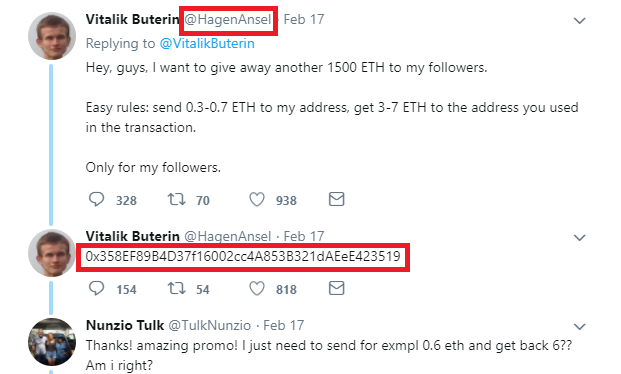No, Vitalik Buterin Is Not Scamming You

Share this article
Vitalik Buterin, the creator of Ethereum, has recently taken to Twitter to warn cryptocurrency investors that cryptos are a “new and hyper-volatile” asset class, dispensing sage advice on not investing more “than you can afford to lose”. Buterin’s point was illustrated succinctly in the first reply to the tweet— a copycat scammer who has now collected more than $40k by impersonating the Canadian-Russian programmer.
Buterin warned crypto investors on the 17th of the risks of investing in digital currencies, stating that cryptocurrencies “could drop to near zero at any time.” While the crypto community is now used to hearing such warnings from the mainstream media, it’s somewhat surprising to see industry proponents such as Buterin spreading what is colloquially referred to as “FUD”.
Fools and Their ETH Are Easily Parted
Buterin’s followers can clearly afford to lose a lot, given the amount of crypto newbs that fell for a bot-driven scam that targeted Buterin’s post within seconds of it going live. In a coordinated operation, Buterin’s post was replied to by a Twitter account that shared the same name and profile picture as Buterin’s official twitter. As of the time of this report, scammer replies are still flooding Buterin’s original post.
Reminder: cryptocurrencies are still a new and hyper-volatile asset class, and could drop to near-zero at any time. Don’t put in more money than you can afford to lose. If you’re trying to figure out where to store your life savings, traditional assets are still your safest bet.
— Vitalik Buterin (@VitalikButerin) February 17, 2018
The post stated that Buterin would be “giving away” 700 ETH to the first 140 senders that sent “0.5 ETH” to a wallet address that was supplied in the next reply. The wallet address is question was promoted by several bots targeting the Twitter thread— although it’s painfully obvious that the post is a copycat:
Above: A copycat poster and a bot reply
Viewing the wallet address linked to in the post via Etherscan reveals that over 80 people fell for the painfully obvious scam, lining the pockets of the enterprising scammer with more than $40,000 USD in Ethereum. 30 ETH was withdrawn from this wallet address to another several hours after the post went live, with another $10,000 still in the wallet.
Sadly, viewing the inbound transactions reveals that some ETH holders that fell for the scam couldn’t even get scammed correctly, failing to follow the instructions provided in the copycat post and sending incorrect amounts of ETH.
If you’re genuinely concerned about the possibility of getting scammed on Twitter, EtherSecurityLookup is a handy Chrome browser plugin that will identify copycat accounts and notify you in-browser.
Vitalik Buterin Responds, Doesn’t Seem To Need Your Money
Buterin has since updated his Twitter, assisting crypto newbs with another nugget of wisdom that may not appear obvious to some:
Time that it takes for scammers to copy my new profile picture: 10 minutes.
DON’T TRUST ANYONE ASKING FOR OR OFFERING MONEY ON TWITTER.
DON’T TRUST ANYONE ASKING FOR OR OFFERING MONEY ON TWITTER.
DON’T TRUST ANYONE ASKING FOR OR OFFERING MONEY ON TWITTER. https://t.co/wcDAJoh6jD— Vitalik Buterin (@VitalikButerin) February 18, 2018
Jokes aside, the fact that so many ETH holders fell for this scam is sad indeed, and paints a depressing picture of the average IQ of some cryptocurrency investors.
If somebody is offering you the opportunity to multiply your capital by sending it away in an irreversible transaction via Twitter, it’s a scam. We shouldn’t even need to state this.
With that being said, not all crypto media are created alike.
The debacle also demonstrates the current state of cryptocurrency media — crypto news site CCN was quick to point the finger at Buterin for “scamming” his followers, drawing the ire of the Ethereum creator:
Cryptocurrency media is now, even if out of ignorance/stupidity, complicit in making twitter scams look more legit.
Also, the ECF is *not* an EF initiative; it’s an independent community organization with some EF participants as advisors.
Shame, https://t.co/JE9wIWmITL. pic.twitter.com/aM4YpjJIP7
— Vitalik Buterin (@VitalikButerin) February 18, 2018
CCN has since published a retraction in their article: “The article has been amended to remove previously erroneous reporting of a Twitter scammer purporting to be Vitalik Buterin. We sincerely apologize to Mr.Buterin and our readers for the flagrant mistake.”
But the erroneous reporting is a clear indicator that the crypto news media cycle is in drastic need of an overhaul – or at least, some professionalism.
Checking facts is the most basic function of any news site. All news outlets are subject to occasional erroneous reporting – the US President virtually wets his pants every time the New York Times omits a comma – but accusing an industry leader of perpetrating an obvious scam is both abysmal reporting and quite possibly actionable by those who lost money as well as Mr. Buterin.
Given that the crypto media is so enthusiastic about telling readers to “do your own research”, some outlets might consider starting in their own back yard.
Share this article


